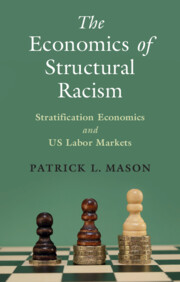Book contents
- The Economics of Structural Racism
- Cambridge Studies in Stratification Economics: Economics and Social Identity
- The Economics of Structural Racism
- Copyright page
- Dedication
- Contents
- Figures
- Tables
- Part I Foundations
- Part II African American Educational Progress and Transformations in Family Structure, 1965–Present
- Part III African American Income and Wealth, 1965–Present
- Part IV Structural Racism, 1965–Present
- 11 Structural Racism and Persistent Disparity
- 12 The Criminal Legal System and Hate Crimes
- Part V Restatement and Discussion
- References
- Index
12 - The Criminal Legal System and Hate Crimes
from Part IV - Structural Racism, 1965–Present
Published online by Cambridge University Press: 06 April 2023
- The Economics of Structural Racism
- Cambridge Studies in Stratification Economics: Economics and Social Identity
- The Economics of Structural Racism
- Copyright page
- Dedication
- Contents
- Figures
- Tables
- Part I Foundations
- Part II African American Educational Progress and Transformations in Family Structure, 1965–Present
- Part III African American Income and Wealth, 1965–Present
- Part IV Structural Racism, 1965–Present
- 11 Structural Racism and Persistent Disparity
- 12 The Criminal Legal System and Hate Crimes
- Part V Restatement and Discussion
- References
- Index
Summary
There are racial differences in treatment by police. As the percent minority increases within a jurisdiction, racial threat effects cause more intense policing against Blacks and Latinx. In response, racial and ethnic minorities use the political process to increase own-group representation and better treatment by police. Police respond to Black protests against abuse of authority with more aggressive policing. There are backlash (more shootings) and diversity (fewer shootings) effects by police in response to affirmative action lawsuits forcing the agency to hire more ethnic and racial minority police. Abuse of force increases when: an officer’s peer has been injured on the job, officers know the race of a civilian prior to interaction, White officers interact with Black citizens, and White officers are dispatched to a Black neighborhood. Police abuse of force has negative academic and behavioral effects on Black and Latinx youth. Mass incarceration has deleterious effects on Black families: reducing the probabilities of marriage and attending college and increasing racial inequality and the probability a child is born to an unmarried mother. Hate crimes are instrumental actions, increasing with racial economic competition. Increases in hate crimes increase racialization among the targeted social group.
Keywords
- Type
- Chapter
- Information
- The Economics of Structural RacismStratification Economics and US Labor Markets, pp. 312 - 334Publisher: Cambridge University PressPrint publication year: 2023

